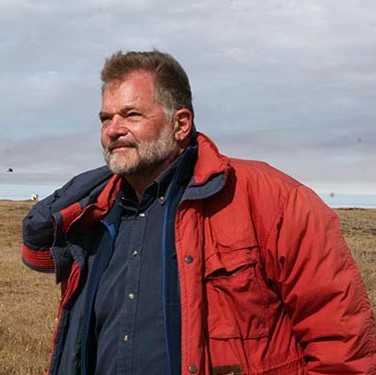Walter Oechel

Distinguished Professor & Director, Global Change Research Group
Department of Biology
SDSU Coastal and Marine Institute
Center for Research in Mathematics and Science Education
Primary Email: [email protected]
Phone/Fax
Primary Phone: 619-594-7831
Building/Location
Physical Sciences - 240
Website Links
Bio
Dr. Oechel’s research focuses on developing and understanding the predictive capability of the interconnections of terrestrial, atmospheric, and marine systems on global change. He focuses primarily in the Arctic (Alaska, Russia), the Pacific Basin (Baja California Sur, Mexico, Indonesia), and the semi-arid ecosystems of Italy and San Diego. He incorporates a small research aircraft, eddy covariance towers, soil measurements, remote sensing, and modeling in his research programs. He leads a highly active research group with funding averaging $1.4 million/year, and he advises two Ph.D. students and several Master’s and undergraduate students.
Areas of Specialization
The SDSU Global Change Research Group is conducting research to elucidate the responses of plants and ecosystems to elevated atmospheric carbon in order to aid the understanding of potential changes, so that politicians can make informed policy decisions that affect the world’s biological future. San Diego State University has been carrying out various aspects of ecological research on chaparral and arctic ecosystems since the early 1970’s. Activities have dealt with ecosystem modeling, basic physiological characteristics of the plants, nutrient dynamics of the plants and soil, water use, above and below ground biomass, light, energy, temperature, wind speed and precipitation. In the chaparral, work has taken place primarily in California and Chile with cooperative studies being done in other Mediterranean regions including South Africa, Australia, France, Spain and Italy. Arctic research is primarily focused on the North Slope of Alaska, with past research done on the Seaward Peninsula, in the Taiga around Fairbanks, Iceland, Western Siberia, and the Far East of Russia. In the Arctic, the focus is to understand the system so as to minimize any potential negative effects of oil development. In the chaparral, the major concern has been damage to homes due to wildfire, and maintaining an optimal age stand so as to yield the maximum amount of water from a watershed, minimize erosion, and support a healthy and diverse wildlife population. The GCRG is still primarily working on CO2 studies in the tundra and chaparral ecosystems, but the focus in recent years has been to examine plant and ecosystem responses to elevated CH4.
Publications
Musavi, T., Migliavacca, …, Kalhori, …, Oechel, …, and Mahecha, M. D. (2016), Potential and limitations of inferring ecosystem photosynthetic capacity from leaf functional traits. Ecology and Evolution, 6: 7352-7366. doi:10.1002/ece3.2479
Zona D., B. Gioli, R. Commane, …, W. C. Oechel. (2016). Cold season emissions dominate the Arctic tundra methane budget. PNAS, doi: 10.1073/pnas.1516017113.
Ikawa, H., and W. C. Oechel. (2015). Temporal variations in air-sea CO2 exchange near large kelp beds near San Diego, California, J. Geophys. Res. Oceans, 120, doi:10.1002/ 2014JC010229.
Shao, JJ, Zhou, XH, Luo, YQ, …, Oechel, W. C, …, Zhang, JH. (2015). Biotic and climatic controls on interannual variability in carbon fluxes across terrestrial ecosystems. Ag and For. Met. (205:11-22). doi: 10.1016/j.agrformet.2015.02.007.
Petrescu, AMR, Lohila, A Tuovinen, …, Oechel, W. C, …, Zona, D, …, C Cescatti, A. (2015). The uncertain climate footprint of wetlands under human pressure. PNAS (12:4594-4599). doi: 10.1073/pnas.1416267112.
Yan, H Wang, SQ Billesbach, D, Oechel, W.C, …, Shugart, HH. (2014) Improved global simulations of gross primary product based on a new definition of water stress factor and a separate treatment of C3 and C4 plants. Ecol. Modelling (297:42-59). DOI: 10.1016/j.ecolmodel.2014.11.002.
Kasurinen, V, Alfredsen, K, Kolari, P, …, Oechel, W. C, …, Berninger, F. (2014) Latent heat exchange in the boreal and arctic biomes. Global Change Biology (20: 3439-3456). doi: 10.1111/gcb.12640.
Ueyama, M, Ichii, K, Iwata, H, …, Zona, D, …, Oechel, W. C. (2014) Change in surface energy balance in Alaska due to fire and spring warming, based on upscaling eddy covariance measurements. JGR-BIOGEOSCIENCES. Volume: 119 Issue: 20 Pages: 1947-1969. DOI: 10.1002/2014JG002717.
H.N. Mbufong, M. Lund, M. Aurela, T.R. Christensen, W.C. Oechel, et al. (2014). Assesing the Spatial variability in peak season CO2 exchange characteristics across the Arctic tundra using a light response curve paramterization. Biogeosciences, 11, 4897-4912.
Ikawa, H and W. C. Oechel. (2014). Spatial and temporal variability of air-sea CO2 exchange of alongshore waters in summer near Barrow, Alaska. Coastal and Shelf Science, Volume: 141, 37-46.
